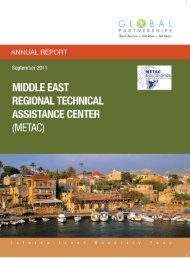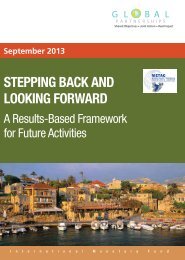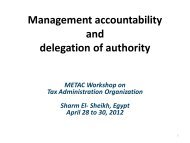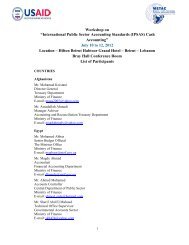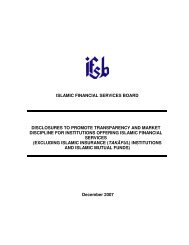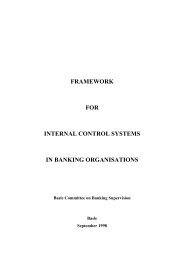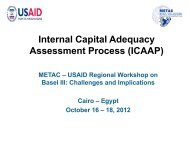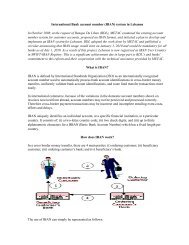- Page 1 and 2:
Contents Foreword..................
- Page 3 and 4:
Contents D. The Incorporating of Ne
- Page 5 and 6:
Contents E. Industry Price Indices
- Page 7 and 8:
Contents Table 19.23 Manufacturing
- Page 9 and 10:
Foreword This Producer Price Index
- Page 11 and 12:
Preface The ILO, IMF, OECD, UNECE,
- Page 13 and 14:
Preface source (rather than requiri
- Page 15 and 16:
Preface tremendous concern with sam
- Page 17 and 18:
Preface among countries. However, t
- Page 19 and 20:
Preface Chapter 6 Chapter 7 Chapter
- Page 21 and 22:
Reader’s Guide International manu
- Page 23 and 24:
Reader’s Guide the System of Nati
- Page 25 and 26:
Abbreviations ABS ABS AF ANZIC ATM
- Page 27 and 28:
Abbreviations OLS Ottawa Group P C
- Page 29:
PART I Methods, Uses, and Coverage
- Page 32 and 33:
Producer Price Index Manual The exp
- Page 34 and 35:
Producer Price Index Manual B.1 Pri
- Page 36 and 37:
Producer Price Index Manual and qua
- Page 38 and 39:
Producer Price Index Manual B.2 The
- Page 40 and 41:
Producer Price Index Manual 1.57 Th
- Page 42 and 43:
Producer Price Index Manual isfy th
- Page 44 and 45:
Producer Price Index Manual D. The
- Page 46 and 47:
Producer Price Index Manual also ar
- Page 48 and 49:
Producer Price Index Manual theoret
- Page 50 and 51:
Producer Price Index Manual on a fi
- Page 52 and 53:
Producer Price Index Manual Laspeyr
- Page 54 and 55:
Producer Price Index Manual qvist i
- Page 56 and 57:
Producer Price Index Manual • The
- Page 58 and 59:
Producer Price Index Manual tion, c
- Page 60 and 61:
Producer Price Index Manual J. Seas
- Page 62 and 63:
Producer Price Index Manual particu
- Page 64 and 65:
Producer Price Index Manual above t
- Page 66 and 67:
Producer Price Index Manual limited
- Page 68 and 69:
Producer Price Index Manual the rev
- Page 70 and 71:
Producer Price Index Manual for the
- Page 72 and 73:
Producer Price Index Manual duce th
- Page 74 and 75:
Producer Price Index Manual O.2.3 A
- Page 76 and 77:
Producer Price Index Manual these c
- Page 78 and 79:
Producer Price Index Manual decisio
- Page 80 and 81:
Producer Price Index Manual 1.300 A
- Page 82 and 83:
Producer Price Index Manual ample,
- Page 84 and 85:
Producer Price Index Manual sample
- Page 86 and 87:
Producer Price Index Manual 1.359 A
- Page 88 and 89:
Producer Price Index Manual 1.379 I
- Page 90 and 91:
Producer Price Index Manual point o
- Page 92 and 93:
Producer Price Index Manual 2.18 Th
- Page 94 and 95:
Producer Price Index Manual two Man
- Page 96 and 97:
Producer Price Index Manual both th
- Page 98 and 99:
Producer Price Index Manual ber cou
- Page 100 and 101:
Producer Price Index Manual are the
- Page 102 and 103:
Producer Price Index Manual mediate
- Page 104 and 105:
Producer Price Index Manual treated
- Page 106 and 107:
Producer Price Index Manual price a
- Page 108 and 109:
Producer Price Index Manual C. Geog
- Page 110 and 111:
Producer Price Index Manual erage i
- Page 112 and 113:
Producer Price Index Manual improve
- Page 115:
PART II Compilation Issues
- Page 118 and 119:
Producer Price Index Manual C. Appr
- Page 120 and 121:
Producer Price Index Manual Figure
- Page 122 and 123:
Producer Price Index Manual sizes f
- Page 124 and 125:
Producer Price Index Manual source
- Page 126 and 127:
Producer Price Index Manual prices
- Page 128 and 129:
Producer Price Index Manual prices
- Page 130 and 131:
5. Sampling Issues in Price Collect
- Page 132 and 133:
Producer Price Index Manual • Wil
- Page 134 and 135:
Producer Price Index Manual tory su
- Page 136 and 137:
Producer Price Index Manual D.1.2 C
- Page 138 and 139:
Producer Price Index Manual 5.44 Th
- Page 140 and 141:
Producer Price Index Manual (5.2) f
- Page 142 and 143:
Producer Price Index Manual Table 5
- Page 144 and 145:
Producer Price Index Manual sales i
- Page 146 and 147:
Producer Price Index Manual 5.90 Th
- Page 148 and 149:
Producer Price Index Manual 5.100 I
- Page 150 and 151:
Producer Price Index Manual estimat
- Page 152 and 153:
Producer Price Index Manual the ris
- Page 154 and 155:
Producer Price Index Manual more de
- Page 156 and 157:
Producer Price Index Manual Field c
- Page 158 and 159:
Producer Price Index Manual 6.68 A
- Page 160 and 161:
Producer Price Index Manual with th
- Page 162 and 163:
Producer Price Index Manual of prod
- Page 164 and 165:
Producer Price Index Manual ances.
- Page 166 and 167:
Producer Price Index Manual RESPOND
- Page 168 and 169:
7. Treatment of Quality Change A. I
- Page 170 and 171:
Producer Price Index Manual 7.12 Co
- Page 172 and 173:
Producer Price Index Manual current
- Page 174 and 175:
Producer Price Index Manual success
- Page 176 and 177:
Producer Price Index Manual contrib
- Page 178 and 179:
Producer Price Index Manual per uni
- Page 180 and 181:
Producer Price Index Manual variety
- Page 182 and 183:
Producer Price Index Manual B.2.6 S
- Page 184 and 185:
Producer Price Index Manual • Qua
- Page 186 and 187:
7. Treatment of Quality Change Tabl
- Page 188 and 189:
Producer Price Index Manual situati
- Page 190 and 191:
Producer Price Index Manual = 1….
- Page 192 and 193:
Producer Price Index Manual prices
- Page 194 and 195:
Producer Price Index Manual item 7.
- Page 196 and 197:
Producer Price Index Manual line in
- Page 198 and 199:
Producer Price Index Manual tionshi
- Page 200 and 201:
7. Treatment of Quality Change Tabl
- Page 202 and 203:
Producer Price Index Manual 7.133 H
- Page 204 and 205:
Producer Price Index Manual Let us
- Page 206 and 207:
Producer Price Index Manual referen
- Page 208 and 209:
Producer Price Index Manual Figure
- Page 210 and 211:
Producer Price Index Manual cal age
- Page 212 and 213:
Producer Price Index Manual There a
- Page 214 and 215:
Producer Price Index Manual new pro
- Page 216 and 217:
Producer Price Index Manual (7.31b)
- Page 218 and 219:
Producer Price Index Manual for the
- Page 220 and 221:
Producer Price Index Manual H.1 Sho
- Page 222 and 223:
Producer Price Index Manual ⎡ ⎢
- Page 224 and 225:
Producer Price Index Manual Price S
- Page 226 and 227:
Producer Price Index Manual B. Samp
- Page 228 and 229:
Producer Price Index Manual B.3 Sam
- Page 230 and 231:
Producer Price Index Manual common.
- Page 232 and 233:
Producer Price Index Manual price p
- Page 234 and 235:
Producer Price Index Manual duction
- Page 236 and 237:
Producer Price Index Manual which s
- Page 238 and 239:
Producer Price Index Manual (v) Pro
- Page 240 and 241:
Producer Price Index Manual However
- Page 242 and 243:
Producer Price Index Manual tions.
- Page 244 and 245:
Producer Price Index Manual Table 9
- Page 246 and 247:
Producer Price Index Manual 9.24 Th
- Page 248 and 249:
Producer Price Index Manual in resp
- Page 250 and 251:
Producer Price Index Manual for a d
- Page 252 and 253:
Producer Price Index Manual Table 9
- Page 254 and 255:
9. PPI Calculation in Practice clud
- Page 256 and 257:
Producer Price Index Manual B.6.2 S
- Page 258 and 259:
Producer Price Index Manual index a
- Page 260 and 261:
Producer Price Index Manual The adv
- Page 262 and 263:
Producer Price Index Manual whether
- Page 264 and 265:
Producer Price Index Manual nity to
- Page 266 and 267:
Producer Price Index Manual Table 9
- Page 268 and 269:
Producer Price Index Manual problem
- Page 270 and 271:
Producer Price Index Manual Dec00:
- Page 272 and 273:
Producer Price Index Manual fixed b
- Page 274 and 275:
Producer Price Index Manual D.1 Ide
- Page 276 and 277:
Producer Price Index Manual 9.168 T
- Page 278 and 279:
Producer Price Index Manual cally,
- Page 280 and 281:
Producer Price Index Manual ply the
- Page 282 and 283:
Producer Price Index Manual B.2 Ann
- Page 284 and 285:
Producer Price Index Manual 10.43 C
- Page 286 and 287:
Producer Price Index Manual • Ble
- Page 288 and 289: Producer Price Index Manual tionate
- Page 290 and 291: Producer Price Index Manual importa
- Page 292 and 293: Producer Price Index Manual Given t
- Page 294 and 295: Producer Price Index Manual 10.123
- Page 296 and 297: Producer Price Index Manual duced o
- Page 298 and 299: Producer Price Index Manual their d
- Page 300 and 301: Producer Price Index Manual solve t
- Page 302 and 303: Producer Price Index Manual the ave
- Page 304 and 305: Producer Price Index Manual would b
- Page 306 and 307: Producer Price Index Manual service
- Page 308 and 309: Producer Price Index Manual these c
- Page 310 and 311: Producer Price Index Manual 10.268
- Page 312 and 313: Producer Price Index Manual 10.283
- Page 314 and 315: Producer Price Index Manual (a) Res
- Page 316 and 317: Producer Price Index Manual 10. Rec
- Page 318 and 319: Producer Price Index Manual 10.308
- Page 320 and 321: Producer Price Index Manual Voice m
- Page 322 and 323: Producer Price Index Manual USAGE C
- Page 324 and 325: 11. Errors and Bias in the PPI disp
- Page 326 and 327: Producer Price Index Manual 11.12 I
- Page 328 and 329: Producer Price Index Manual 11.24 T
- Page 330 and 331: Producer Price Index Manual of the
- Page 332 and 333: Producer Price Index Manual unitary
- Page 335 and 336: 12. Organization and Management A.
- Page 337: 12. Organization and Management ass
- Page 341 and 342: 12. Organization and Management rie
- Page 343 and 344: 12. Organization and Management det
- Page 345 and 346: 12. Organization and Management Vis
- Page 347 and 348: 12. Organization and Management fou
- Page 349 and 350: 13. Publication, Dissemination, and
- Page 351 and 352: 13. Publication, Dissemination, and
- Page 353 and 354: 13. Publication, Dissemination, and
- Page 355 and 356: 13. Publication, Dissemination, and
- Page 357 and 358: 13. Publication, Dissemination, and
- Page 359: 13. Publication, Dissemination, and
- Page 363 and 364: 14. The System of Price Statistics
- Page 365 and 366: 14. The System of Price Statistics
- Page 367 and 368: 14. The System of Price Statistics
- Page 369 and 370: 14. The System of Price Statistics
- Page 371 and 372: 14. The System of Price Statistics
- Page 373 and 374: Producer Price Index Manual Table 1
- Page 375 and 376: 14. The System of Price Statistics
- Page 377 and 378: 14. The System of Price Statistics
- Page 379 and 380: 14. The System of Price Statistics
- Page 381 and 382: 14. The System of Price Statistics
- Page 383 and 384: 14. The System of Price Statistics
- Page 385 and 386: 14. The System of Price Statistics
- Page 387 and 388: 14. The System of Price Statistics
- Page 389 and 390:
14. The System of Price Statistics
- Page 391 and 392:
14. The System of Price Statistics
- Page 393 and 394:
14. The System of Price Statistics
- Page 395 and 396:
14. The System of Price Statistics
- Page 397 and 398:
I 14. The System of Price Statistic
- Page 399 and 400:
15. Basic Index Number Theory 371 k
- Page 401 and 402:
15. Basic Index Number Theory 373 1
- Page 403 and 404:
15. Basic Index Number Theory 375 l
- Page 405 and 406:
15. Basic Index Number Theory 377 T
- Page 407 and 408:
15. Basic Index Number Theory 379 1
- Page 409 and 410:
15. Basic Index Number Theory 381 1
- Page 411 and 412:
15. Basic Index Number Theory 383 n
- Page 413 and 414:
15. Basic Index Number Theory 385 c
- Page 415 and 416:
15. Basic Index Number Theory 387 (
- Page 417 and 418:
15. Basic Index Number Theory 389 t
- Page 419 and 420:
15. Basic Index Number Theory 391 t
- Page 421 and 422:
15. Basic Index Number Theory 393 (
- Page 423 and 424:
15. Basic Index Number Theory 395 C
- Page 425 and 426:
15. Basic Index Number Theory 397 (
- Page 427 and 428:
15. Basic Index Number Theory 399 A
- Page 429 and 430:
15. Basic Index Number Theory 401 A
- Page 431 and 432:
16. Axiomatic and Stochastic Approa
- Page 433 and 434:
16. Axiomatic and Stochastic Approa
- Page 435 and 436:
16. Axiomatic and Stochastic Approa
- Page 437 and 438:
16. Axiomatic and Stochastic Approa
- Page 439 and 440:
16. Axiomatic and Stochastic Approa
- Page 441 and 442:
16. Axiomatic and Stochastic Approa
- Page 443 and 444:
16. Axiomatic and Stochastic Approa
- Page 445 and 446:
16. Axiomatic and Stochastic Approa
- Page 447 and 448:
16. Axiomatic and Stochastic Approa
- Page 449 and 450:
16. Axiomatic and Stochastic Approa
- Page 451 and 452:
16. Axiomatic and Stochastic Approa
- Page 453 and 454:
16. Axiomatic and Stochastic Approa
- Page 455 and 456:
16. Axiomatic and Stochastic Approa
- Page 457 and 458:
16. Axiomatic and Stochastic Approa
- Page 459 and 460:
16. Axiomatic and Stochastic Approa
- Page 461 and 462:
16. Axiomatic and Stochastic Approa
- Page 463 and 464:
17. Economic Approach A. Introducti
- Page 465 and 466:
17. Economic Approach input price v
- Page 467 and 468:
17. Economic Approach possibilities
- Page 469 and 470:
17. Economic Approach the numerator
- Page 471 and 472:
17. Economic Approach 17.28 The new
- Page 473 and 474:
17. Economic Approach 17.36 The abo
- Page 475 and 476:
17. Economic Approach riod t establ
- Page 477 and 478:
17. Economic Approach 17.49 Suppose
- Page 479 and 480:
17. Economic Approach perlative ind
- Page 481 and 482:
17. Economic Approach (17.35) C 0 (
- Page 483 and 484:
17. Economic Approach (17.46) P T (
- Page 485 and 486:
17. Economic Approach ing flexible
- Page 487 and 488:
17. Economic Approach P W (p 0 ,p 1
- Page 489 and 490:
17. Economic Approach constraint, f
- Page 491 and 492:
18. Aggregation Issues A. Introduct
- Page 493 and 494:
18. Aggregation Issues (18.4) R 0 (
- Page 495 and 496:
18. Aggregation Issues (18.14) R(p
- Page 497 and 498:
18. Aggregation Issues Then, this n
- Page 499 and 500:
18. Aggregation Issues (18.28) P 1
- Page 501 and 502:
18. Aggregation Issues index, P(p y
- Page 503 and 504:
18. Aggregation Issues , = 1 N M
- Page 505 and 506:
18. Aggregation Issues N M 1 1 1 1
- Page 507 and 508:
18. Aggregation Issues (18.56) p t
- Page 509 and 510:
18. Aggregation Issues 18.67 Howeve
- Page 511 and 512:
18. Aggregation Issues (18.71) p t
- Page 513 and 514:
19. Price Indices Using an Artifici
- Page 515 and 516:
19. Price Indices Using an Artifici
- Page 517 and 518:
19. Price Indices Using an Artifici
- Page 519 and 520:
19. Price Indices Using an Artifici
- Page 521 and 522:
19. Price Indices Using an Artifici
- Page 523 and 524:
19. Price Indices Using an Artifici
- Page 525 and 526:
19. Price Indices Using an Artifici
- Page 527 and 528:
19. Price Indices Using an Artifici
- Page 529 and 530:
19. Price Indices Using an Artifici
- Page 531 and 532:
19. Price Indices Using an Artifici
- Page 533 and 534:
19. Price Indices Using an Artifici
- Page 535 and 536:
19. Price Indices Using an Artifici
- Page 537 and 538:
20. Elementary Indices Any aggregat
- Page 539 and 540:
20. Elementary Indices 20.13 Practi
- Page 541 and 542:
20. Elementary Indices P D . For ea
- Page 543 and 544:
20. Elementary Indices listed in Ch
- Page 545 and 546:
20. Elementary Indices approach hel
- Page 547 and 548:
20. Elementary Indices (20.41) M
- Page 549 and 550:
20. Elementary Indices price collec
- Page 551 and 552:
20. Elementary Indices penditure sh
- Page 553 and 554:
21. Quality Change and Hedonics 21.
- Page 555 and 556:
21. Quality Change and Hedonics uni
- Page 557 and 558:
21. Quality Change and Hedonics cha
- Page 559 and 560:
21. Quality Change and Hedonics by
- Page 561 and 562:
21. Quality Change and Hedonics Die
- Page 563 and 564:
21. Quality Change and Hedonics per
- Page 565 and 566:
21. Quality Change and Hedonics lis
- Page 567 and 568:
21. Quality Change and Hedonics mar
- Page 569 and 570:
21. Quality Change and Hedonics or
- Page 571 and 572:
21. Quality Change and Hedonics are
- Page 573 and 574:
21. Quality Change and Hedonics aga
- Page 575 and 576:
21. Quality Change and Hedonics Thi
- Page 577 and 578:
21. Quality Change and Hedonics Cha
- Page 579 and 580:
21. Quality Change and Hedonics for
- Page 581 and 582:
22. Treatment of Seasonal Products
- Page 583 and 584:
22. Treatment of Seasonal Products
- Page 585 and 586:
22. Treatment of Seasonal Products
- Page 587 and 588:
22. Treatment of Seasonal Products
- Page 589 and 590:
22. Treatment of Seasonal Products
- Page 591 and 592:
22. Treatment of Seasonal Products
- Page 593 and 594:
22. Treatment of Seasonal Products
- Page 595 and 596:
22. Treatment of Seasonal Products
- Page 597 and 598:
22. Treatment of Seasonal Products
- Page 599 and 600:
22. Treatment of Seasonal Products
- Page 601 and 602:
22. Treatment of Seasonal Products
- Page 603 and 604:
22. Treatment of Seasonal Products
- Page 605 and 606:
22. Treatment of Seasonal Products
- Page 607 and 608:
22. Treatment of Seasonal Products
- Page 609 and 610:
22. Treatment of Seasonal Products
- Page 611 and 612:
22. Treatment of Seasonal Products
- Page 613 and 614:
22. Treatment of Seasonal Products
- Page 615 and 616:
22. Treatment of Seasonal Products
- Page 617 and 618:
22. Treatment of Seasonal Products
- Page 619 and 620:
22. Treatment of Seasonal Products
- Page 621 and 622:
22. Treatment of Seasonal Products
- Page 623 and 624:
Producer Price Index Manual 616 ter
- Page 625 and 626:
Producer Price Index Manual 618 ed.
- Page 627 and 628:
Producer Price Index Manual Nationa
- Page 629 and 630:
Producer Price Index Manual 622 ___
- Page 631 and 632:
Producer Price Index Manual 624 Ede
- Page 633 and 634:
Producer Price Index Manual 626 ___
- Page 635 and 636:
Producer Price Index Manual 628 Int
- Page 637 and 638:
Producer Price Index Manual 630 Met
- Page 639 and 640:
Producer Price Index Manual History
- Page 641 and 642:
Producer Price Index Manual 634 Ros
- Page 643 and 644:
Producer Price Index Manual 636 Sin
- Page 645 and 646:
Producer Price Index Manual http://
- Page 647 and 648:
Glossary Accrual recording The reco
- Page 649 and 650:
Producer Price Index Manual Compens
- Page 651 and 652:
Producer Price Index Manual the bas
- Page 653 and 654:
Producer Price Index Manual Gross s
- Page 655 and 656:
Producer Price Index Manual from th
- Page 657 and 658:
Producer Price Index Manual version
- Page 659 and 660:
Producer Price Index Manual they ar
- Page 661 and 662:
Producer Price Index Manual The wei
- Page 663 and 664:
Producer Price Index Manual the res
- Page 665 and 666:
Producer Price Index Manual Virtual
- Page 667:
Producer Price Index Manual that is





